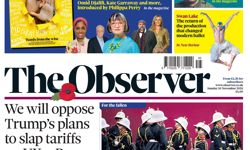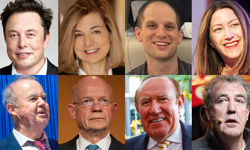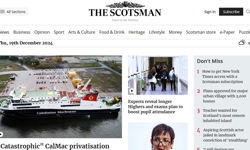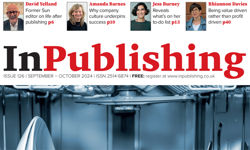Rupert Murdoch once said that when it came to elections or great political issues, the editors of The Times and The Sunday Times were free to make up their own minds.
But with The Sun, and the News of the World, when there was a NoW, that was his call.
At the fourth Newsworks Shift conference, The Sun’s editor-in chief Tony Gallagher was asked whether he would have the freedom to decide whether or not to come out in favour of staying in the European Union in the June referendum, and if so, what was he likely to decide.
Gallagher side-stepped the first part of the question skillfully, and then told the delegates: “We have written about 55 editorials on Europe since I arrived on 14th September and the tone of them is extremely sceptical. Does that mean we are going to campaign for Brexit? I don’t know. I haven’t decided yet.”
The Sun editor, who spoke at the inaugural Newsworks conference as editor of The Daily Telegraph, added that the tone of the coverage on the Cameron EU reform package had been hostile.
In a further clue on which way the populist daily will probably jump, apart from Murdoch’s long-seated Eurosceptic views, Gallagher explained that a detailed audit of the attitude of Sun readers to the European project found them “pretty hostile”.
In his Newsworks interview, Gallagher, who was deputy editor of the Daily Mail between his Telegraph and Sun appointments, said he had been more surprised by the similarities than the differences between the range of newspapers.
“Eighty per cent of what I do at The Sun would fit very well into the Daily Mail and the Telegraph. A key difference is the high percentage of humour, irreverence and the high premium put on exclusive stories and the Sun community,” Gallagher explained.
“We cover everything with equal ferocity,” the Sun editor added.
New revenue streams
Gallagher argued that the future of newsbrands lay in developing new streams of revenue beyond cover price and advertising.
After finding that 14 million people bet in the UK and that 55 per cent of them read The Sun, the paper has formed a partnership with Tabcorp, the largest bookmakers in Australia, to launch SunBets in time for the start of the next Premiership football season.
The Sun editor is also determined to distribute the Sun brands as widely as possible and is planning to use Snapchat Discover as part of a redesigned website.
Gallagher also attacked the concept of journalism as an all-graduate, academic discipline and argued it’s a trade you learn by practicing.
Over the past twenty years, the route into journalism for eighteen year-old school leavers had increasingly been closed.
“That’s something we are looking very closely at in News UK because if you are not reflecting your audience, you could grow apart from them,” Gallagher insisted.
In contrast to The Sun, The Guardian’s first woman editor, Katharine Viner, promised her paper would support the UK staying in the EU, even though the vast majority of national newspapers were for Brexit.
Viner emphasised it was “an absolutely brilliant time” for journalism and told how in the US, The Guardian has assembled more comprehensive national statistics for the numbers shot by the police than the FBI had managed to do.
The contrast between the “brilliant” time for journalism and the commercial outlook for newspapers was however stark.
“The commercial model is undermined at all points, fewer people are buying newspapers, advertising is leaving newspapers, digital advertising is going to Facebook and Google - quite dramatically so in the last year,” said Viner.
The Guardian will still not erect a paywall and instead would seek new streams of revenue by trying to turn loyal readers into paying members.
Ad industry getting it wrong
On the commercial side, Bob Hoffman, a contrarian ad blogger and former advertising agency owner in San Francisco, attacked, what he called, the delusions of his industry, some causing considerable damage to traditional media.
Hoffman, author of Marketers are from Mars, Consumers are from New Jersey, denounced the ad business for being far more obsessed with brands than consumers are, attaching exaggerated importance to digital, and virtually ignoring the over-50s.
On the digital delusion, Hoffman noted that the overwhelming amount of Apple’s advertising money is spent on “the non-digital variety”, mostly on print, TV and outdoor.
“Yet somehow they manage to survive and have become the world’s most valuable company. What have the wizards of advertising learned from Apple – absolutely nothing,” Hoffman said disdainfully.
Another serious delusion, according to Hoffman, involves the over-50s. Nielsen believes they make up the most valuable generation in the history of marketing in the US.
Hoffman said they are responsible for 50 per cent of all consumer spending and control 70 per cent of US wealth, yet are the target for only 10 per cent of American marketing activity.
“I thought there might be some facts to justify this but when I looked, I found none. Most marketers target young people because they see everyone else doing it,” insisted Hoffman. He did not highlight the fact that the over 50s in the US and the UK are more likely to use mainstream media – and vote.
Profiteers and racketeers
There were many warnings at Shift of the growing dangers of ad-blocking which in Europe ranges from 10 per cent in France to 38 per cent in Greece.
In the UK, it has reached 22 per cent, up from 18 per cent in October.
Steve Chester, director of data at the IAB UK said: “If we do nothing about it, it will continue to eat into our audiences.”
The problem of intrusive advertising, which might increase ad-blocking, was being tackled by encouraging the industry to sign up to a charter of good practice.
Anna Hickey, managing director of Maxus UK, described the tech companies behind ad-blocking as “really a bunch of profiteers who are holding our industry to ransom”.
The “ransom” comes in the form of charging a fee to enable advertisers to be added to a white list whose ads escape blocking.
Many young men using ad blockers don’t want advertising but they don’t want to pay for news either.
“The publishing industry must come together to tackle this racketeering and it will get legal and messy quite soon,” Hickey predicted.
As the warnings were being issued at Shift, at the Oxford Media Convention the same day, culture secretary John Whittingdale called ad-blocking “a-modern day protection racket”.
Whittingdale promised he would set up a round table bringing together publishers, social media groups and ad-blocking companies to do something about the phenomena.
The culture secretary stopped a long way short of planning to ban the practice or explain what else he intended to do.
But he did say: “Quite simply – if people don’t pay in some way for content, then that content will no longer exist.”
New measurement systems
As controversy grows about the lack of reliability of digital media data and how many humans, as opposed to robots, are actually watching online video, the Publishers Audience Measurement Company (PAMCo), the successor body to NRS, detailed progress towards more comprehensive measurement systems for newsbrands.
PAMCo chief executive Simon Redican told how AMP – Audience Measurement for Publishers – due to launch in August 2017, would provide for the first time “de-duplicated reach and frequency capability across all platforms”.
At a cost of £35 million over five years, there would be 35,000 in-home face-to-face interviews and 5,000 would have their digital consumption measured passively.
It would produce, Redican promised, “total audience delivered by platform” for 90 titles.
In a separate interview just before Shift 2016, Newsworks chief executive Rufus Olins explained that four years ago, the aim had been to persuade the industry to work more closely together, agencies and advertisers as well as publishers. National newspapers were also shifting from being an industry about paper to an industry about brands.
“Four years on, no one, or very few people, would argue with the fact that the industry has shifted from being essentially a paper-based industry to being an industry that operates on a variety of platforms,” says Olins.
AMP, which would isolate unique users in print, online and mobile, would be “transformational” and the publishers transactional advertising system would, rather belatedly compared with TV and radio, automate the buying of space.
“The other thing we are very pleased about is the level of collaboration we are seeing among our stakeholders,” says Olins, who adds that another Newsworks advertising campaign is on the way.
This one will remind agencies and advertisers of the basic facts and figures of newsbrand audiences and the effectiveness of their publications – numbers such as the 9 million newspapers still picked up every day in the UK and the 46 million reached on all platforms across the month.
For Olins, the industry is at “a threshold” moving from a world it knows to one it doesn’t. And despite very significant challenges, “I think, from the people that I have spoken to, that we are entering, or soon to be entering, a period of greater stability.”
As consultants McKinsey argued recently, most of those consumers likely to abandon print have already done so.
The Newsworks chief executive expressed sadness about the closure of the print edition of the Independent but it would still reach online, larger audiences that it had ever dreamt of, upwards of 70 million.
As for the future, Rufus Olins would like to see even greater collaboration in the industry and an industry focused on growing the advertising cake. He would like to see a greater understanding of the importance of brands and the relationship between print and digital platforms.
In an echo of the approach taken by Bob Hoffman, Olins says he would like people to get in touch with all of the above, “and their common sense”.












